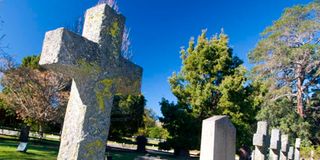Understanding death and the different rituals during funerals

The black hole in our lives left by those that have departed is too deep, too wide, for our human intellect to fathom. This is where the strength of believing in God comes in.
Death recently knocked at my door twice – in April, then in May. The first knock was for my best friend of 23 years.
Her name was Pepe, we met in high school. Pepe was a few days older than I am, she was a single girl with no kids.
The second knock was for my distant cousin. (Well, the wife of my distant cousin.) They had settled abroad and were raising their three boys there. Their oldest is a university freshman.
We buried both ladies in May. What struck me about these two funerals were the traditions and rituals that informed the ceremonies. I was fascinated. And schooled.
The hungry writer in me could not help comparing them for a story.
Pepe was a Kikuyu who grew up in the Presbyterian church. My cousin was a Kalenjin who was buttressed to the Pentecostal church.
With Pepe, we viewed her body only once – at the funeral home on the day of the burial. After the viewing, the convoy hit the highway to the family’s farm in Karatina.
The service was brief (as brief as the one we had had in her childhood church), tributes were limited to one person each who spoke for her family, friends and workmates. We buried Pepe by 1pm, when guests had lunch then hit the highway back to Nairobi.
We left Pepe on the farm, on the slopes of a picturesque tableau with trees that whistle in the wind. I also left with unexpressed grief lingering in my heart. I had to confront it later – in my own time, in my own way.
With my cousin, we viewed her body first at the funeral home, a day after she arrived from abroad. We viewed her again at the church then on the burial site.
The church service ran for four hours – we watched her video clips, listened to pre-recorded tributes from her friends abroad, family emptied their hearts on stage, the pastor delivered a thunderous sermon.
They travelled to Nakuru that same afternoon, where my cousin had hurriedly constructed a structure to call their home. The cement on its bare bones had not even dried properly.
The next day, the day of the burial, the local choir kicked it off at around 11am, guests had lunch then we spent the rest of the day giving more celebratory tributes and introducing family and emptying our hearts. It was cathartic. We buried my cousin in front of her home at around 6pm, while a drone buzzed overhead and the sun set over the Nakuru horizon in rich bursts of fiery orange.
Later that night, we lit a bonfire not too far from the graveside and sat around it – invoking nostalgia, chuckling, feasting on nyama choma – until late into the night, when the chill of the Devil’s Hour pierced through the layers of our smoke-filled jackets and finally coaxed us to slumber.
The DJ played music uninterrupted from dusk to dawn.
I returned to Nairobi with a heart full of sunshine and more love than I could fit in my pocket. I have so much of it that I am giving it away. Here, have some.
No matter how these ceremonies were conducted, what centred them both was God: Religion and its community of believers. Prayer. Gratitude and surrender. Hope in the afterlife. Taking it to church. The comfort of wisdom from the Bible. Hymns that really are poetry.
Thing is, death is far too complex for the human mind to comprehend. Grief is too weighty a burden for the human heart to carry on its own. The black hole in our lives left by those that have departed is too deep, too wide, for our human intellect to fathom. This is where the strength of believing in God comes in.
I struggle with religion. I didn’t get the solid foundation in childhood that would set me up for a nourishing spiritual life in adulthood. I have tried to establish it in my 20s and 30s – especially when I became a mum – but I cannot sustain it. It’s like building a castle on a foundation of sticks.
I don’t pray or go to church as often as I need to. I don’t fast. I cannot quote you scripture in context. I am not attached to any local Bible study group or whatever.
So when death knocks on my door, my castle crumbles into its flimsy foundation.
I tried comprehending Pepe’s death with the capabilities of my mind but it was futile. I would only get headaches in frustration, then cry bitterly.
My cousin surrendered and accepted his wife’s passing from the get go. I keep asking him, ‘How is your heart today, Edu?’ And he always tells me, ‘It is at peace.’
@_craftit; [email protected]





